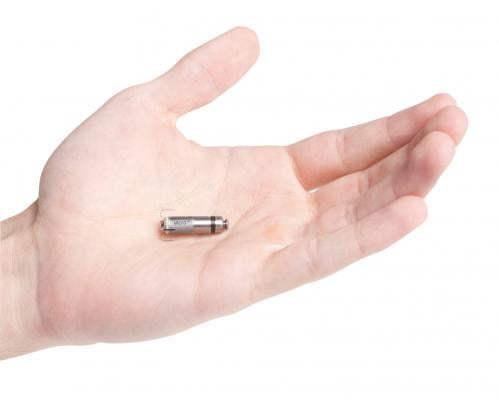
May 21, 2015 — The first-in-human trial of a new miniaturized leadless pacemaker implanted directly inside the heart found the Medtronic Micra transcatheter pacing system (TPS) safe and effective in patients with a slow heart rhythm. Early performance results from the international Micra Transcatheter Pacing Study were presented at Heart Rhythm 2015, the Heart Rhythm Society’s 36th annual scientific sessions, May 13-16 in Boston.
At less than one-tenth the size of traditional pacemakers, the Micra TPS is cosmetically invisible and small enough to be delivered with minimally invasive techniques through a catheter, and implanted directly into the heart. The small size and short length of the Micra device allows physicians to implant more than one device within the heart, if needed.
“The results of this study are very promising and we have seen firsthand how the device size and minimally invasive procedure truly can improve the quality of life for patients,” said lead author Philippe Ritter, M.D. from the Hôpital Haut-Lévêque in Bordeaux, France. “The new miniaturized pacemaker not only eliminates many of the traditional complications associated with conventional transvenous pacing, but it also has the potential to advance patient care and set a new standard for single-chamber pacemakers.”
Permanent cardiac pacing is the only effective treatment for symptomatic bradycardia, or a slow heart rhythm. Patients can experience complications mostly related to the pacing leads and chest pocket. The new miniaturized pacemaker is 93 percent smaller and reduces complication risks compared to conventional transvenous pacing systems because it does not use leads or require a chest pocket. Instead, the device is implanted from the femoral vein and fixated directly in the right ventricle of the heart using protractible nitinol tines.
The Micra Transcatheter Pacing Study enrolled 140 patients with a wide variety of profiles from 37 implanting physicians from 23 countries. These patients spanned a wide variety of patient profiles, including high-risk patients with lung disease such as COPD (chronic obstructive pulmonary disease) and pulmonary hypertension. This interim analysis examined the first 60 patients to undergo implantation of TPS and receive three months of follow-up. The study examined serious adverse events related to TPS, 24-hour ambulatory electrocardiograms and device function. Electrical variables were measured at implant, pre-hospital discharge and after one and three months.
All implant attempts were successful with an average implant time of 37 minutes, and all electrical measurements were within expected ranges at one and three months.
A total of 5.7 percent of patients experienced serious adverse events, which is comparable to traditional systems and there were no procedural-related deaths. Only two patients (1.4 percent) experienced events which resulted in prolonged hospitalization. This rate is in line with rates observed in studies of traditional pacemakers. There were no infections or dislodgments, and no events required surgical re-operation or resulted in death. Further, there were no unanticipated serious adverse device events.
Testing of electrical performance at three months showed the pacing threshold was lower (0.51 V at 0.24 ms) than the pre-specified performance objective (<2 V at 0.24 ms). This led investigators to estimate device longevity based on observed mean pacing percentages is approximately 10 years, which is similar to traditional devices. Examination of 24-hour ambulatory surface ECG and device electrogram indicated expected pacing and sensing performance with no pauses due to inappropriate TPS operation.
“These initial data are quite promising, as patients in this study have fared very well with this novel device,” Ritter said. “If the strong safety and performance profile of the Micra TPS that we’ve seen so far persists over the long-term and in more patients, this transcatheter pacing therapy will prove to be an effective but simpler and less-invasive pacemaker option for many patients.”
The long-term safety and benefits of TPS will be further evaluated in this trial.
For more information: www.hrsonline.org


 January 05, 2026
January 05, 2026 









